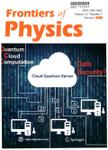Generalized time-dependent generator coordinate method for induced fission dynamics
作者机构:State Key Laboratory of Nuclear Physics and TechnologySchool of PhysicsPeking UniversityBeijing 100871China Physics DepartmentFaculty of ScienceUniversity of Zagreb10000 ZagrebCroatia Center for Circuits and SystemsPeng Cheng LaboratoryShenzhen 518055China
出 版 物:《Frontiers of physics》 (物理学前沿(英文版))
年 卷 期:2024年第19卷第4期
页 面:1-12页
核心收录:
学科分类:07[理学] 070202[理学-粒子物理与原子核物理] 0702[理学-物理学]
基 金:This work was supported in part by the Highend Foreign Experts Plan of China,the National Key R&D Program of China(Contract No.2018YFA0404400) the National Natural Science Foundation of China(Grant Nos.12070131001,11875075,11935003,11975031,and 12141501) the High-performance Computing Platform of Peking University,the QuantiXLie Centre of Excellence,a project co-financed by the Croatian Government and European Union through the European Regional Development Fund-the Competitiveness and Cohesion Operational Programme(KK.01.1.1.01.0004) the Croatian Science Foundation under the project Uncertainty quantification within the nuclear energy density framework(IP-2018-01-5987)
主 题:nuclear density functional theory generator coordinate method fission dynamics
摘 要:The generalized time-dependent generator coordinate method(TD-GCM)is extended to include pairing *** correlated GCM nuclear wave function is expressed in terms of time-dependent generator states and weight *** particle–hole channel of the effective interaction is determined by a Hamiltonian derived from an energy density functional,while pairing is treated dynamically in the standard BCS approximation with time-dependent pairing tensor and single-particle occupation *** the inclusion of pairing correlations,various time-dependent phenomena in open-shell nuclei can be described more *** model is applied to the description of saddle-to-scission dynamics of induced *** generalized TD-GCM charge yields and total kinetic energy distribution for the fission of 240Pu,are compared to those obtained using the standard time-dependent density functional theory(TD-DFT)approach,and with available data.



